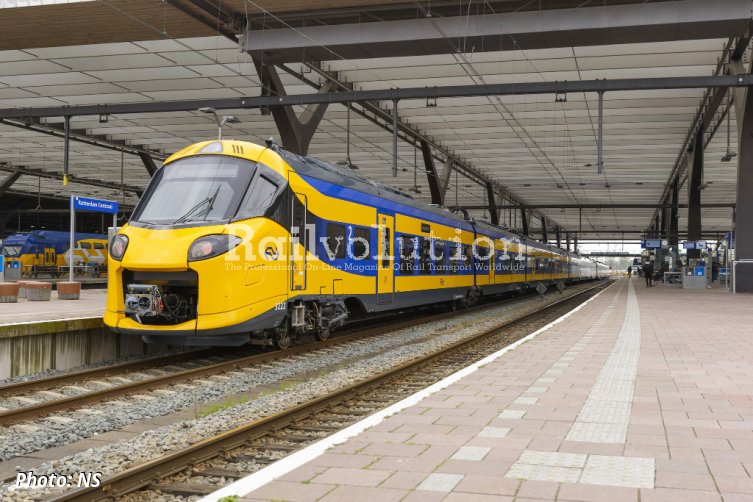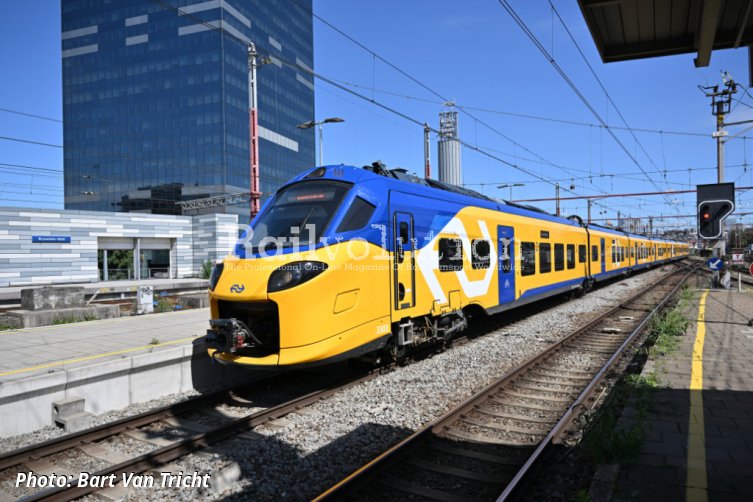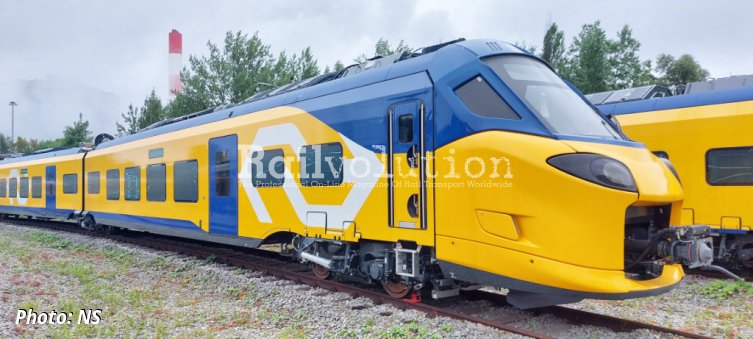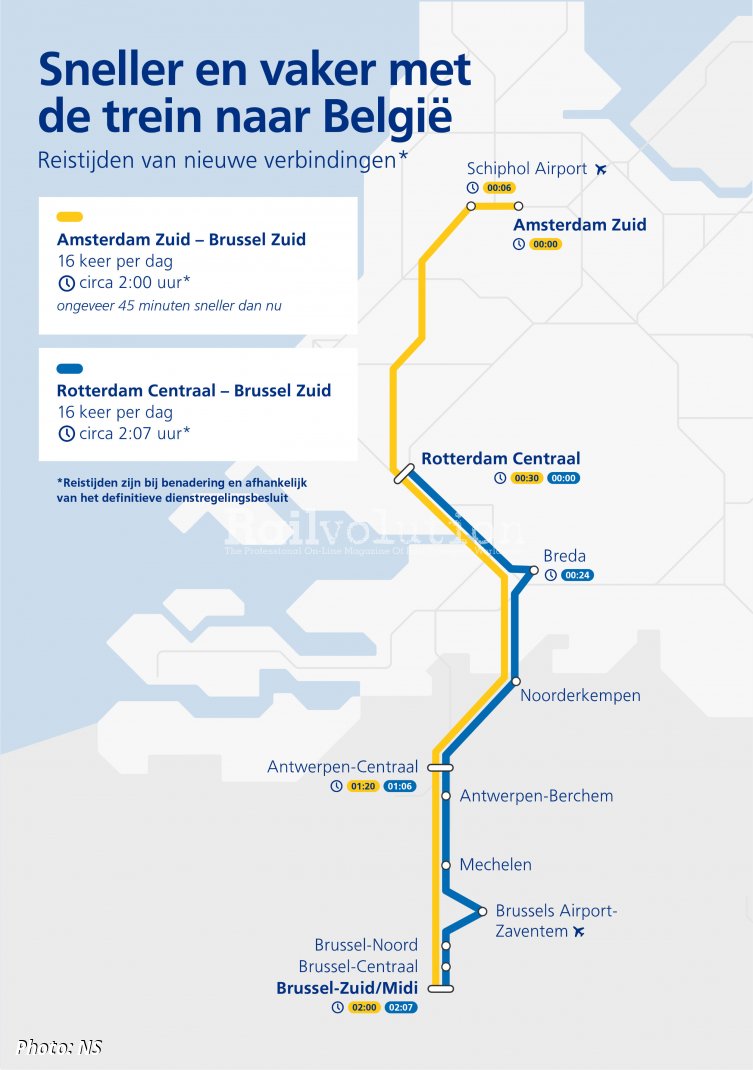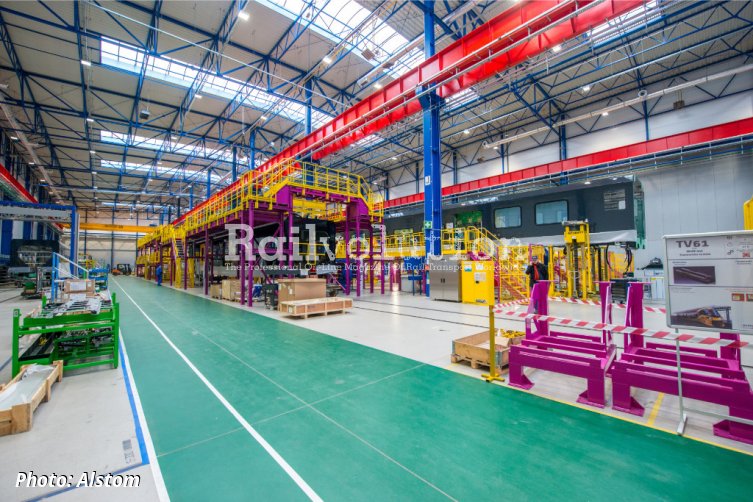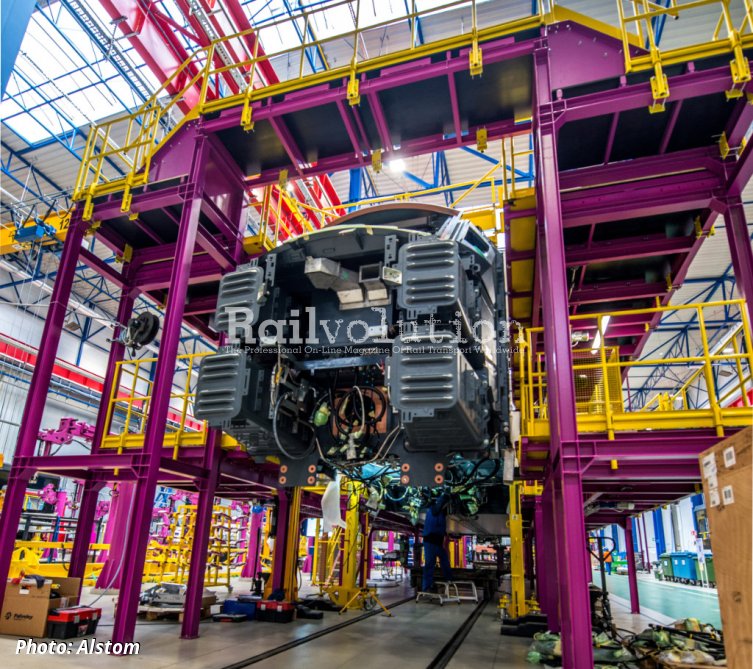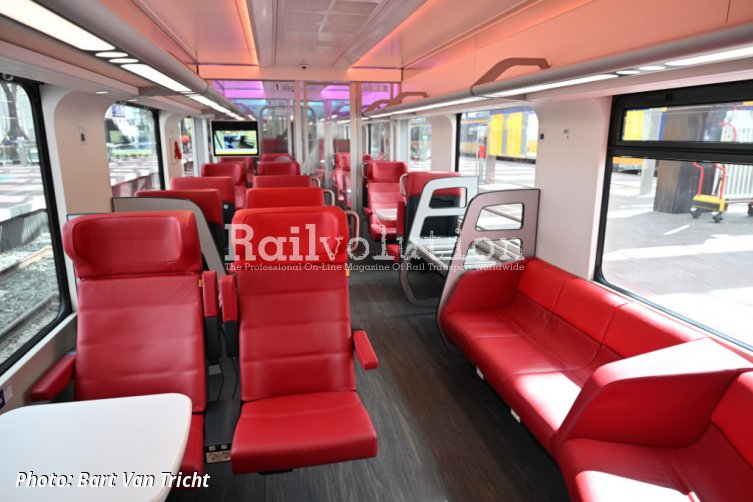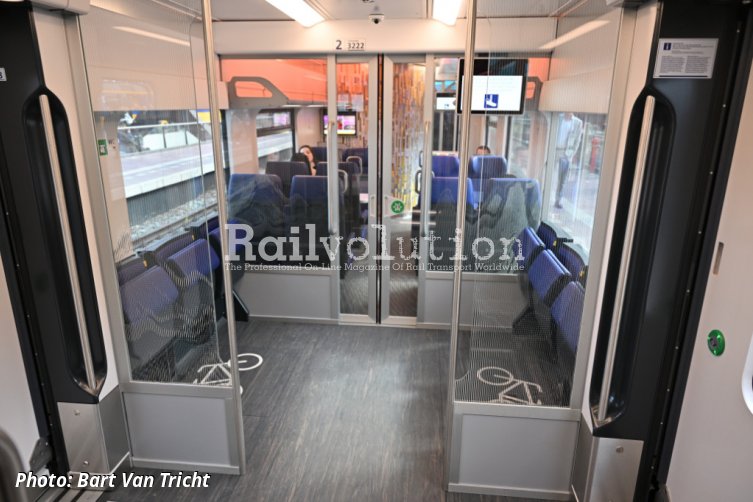ICNG EMUs in service
posted on 30th Aug 2023 12:30
On Wednesday 19 April 2023, NS started a test service with passengers with the first ICNG (Intercity Nieuwe Generatie) units, 3222 and 3133, on the Amsterdam - Rotterdam route. This came after three years of intensive testing and after the operator officially took delivery of the first two ICNGs on 17 April. However, NS Managing Director Wouter Koolmees, who was present at the first roll-out of the new generation of trains, admitted that "there may still be teething problems, as is often the case with new trains". This was confirmed during the first run when a defect was found in the entrance door, which was subsequently repaired and the train was able to continue in test service further.
The start of (test) operation with pasengers was roughly three years behind the contractual deadlines. Initially, ICNG deliveries were planned to start in January 2020 and to enter service in December of the same year, i. e. with the start of the 2021 timetable.
Orders
Given that NS had previously ordered double-deck electric VIRM EMUs for intercity trains, which entered service in 1994, the single-deck version was chosen this time for better accessibility for disabled passengers, which was also a recommendation arising from consultation with Rover, which represents the interests of public transport passengers. According to the orders placed so far, Alstom is to deliver a total of 99 units of the Coradia Stream family with a maximum speed of 200 km/h, worth more than 1 billion EUR.
The history of this contract began in 2014, when a tender was launched involving Alstom, Siemens, Bombardier and Stadler. In July 2016, NS then signed a framework agreement with Alstom and at the same time ordered 49 five-car and 30 eight-car units for a total value of 800 million EUR. Designed to operate only in the Netherlands, these trains have traction equipment for 1.5 kV DC and 25 kV 50 Hz, which allows them to be used on long-distance services on the conventional network and on the HSL-Zuid high-speed line. The five-car trains were designated Class 3100 (Nos. 3101 - 3149), the eight-car trains Class 3200 (Nos. 3201 - 3230).
In addition, NS ordered two eight-car triple-voltage EMUs as prototypes for operation also in Belgium, where traction equipment for 3 kV DC is also needed. Their procurement was to speed up the type approval process in Belgium in the event of a batch order for this version, which was designated ICNG-B. Then on 5 August 2019, NS did indeed acquire this version when it confirmed the option for 18 units worth 200 million EUR, which were designated Class 3300 (Nos. 3301 - 3321 including prototypes). The inventory number 3321, which exceeds the 20-strong batch, corresponds to the fact that NS will eventually receive 21 ICNG-B units, as one ICNG from the Class 3200, whose number range has been changed to 3201 - 3229, will also be delivered as a triple-voltage train.
The ICNGs use Jakobs bogies, the five-car sets of a 110 m length have a Bo' 2' 2' Bo' + 2' 2' Bo' axle arrangement and a power of 2,545 kW, while the eight-car sets of a 165 m length have a Bo' 2' 2' 2' Bo' + Bo' 2' 2' 2' Bo' axle arrangement and a power of 3,390 kW. On the conventional network, they can run at a maximum speed of 160 km/h; in addition to the national ATP of the ATB type for the Netherlands, the ICNGs are equipped with the on-board ETCS for operation on HSL-Zuid and also with TBL1+ ATP for Belgium. The five-car version has 256 seats, the eight-car one for the Netherlands has 417 seats and the version for service to Belgium has the number of seats reduced to 413 due to the additional luggage space.
With this almost 100-strong fleet, the operator will be able to offer a capacity of approximately 33,300 seats. In addition, NS is now considering ordering ICNG units capable of going to Germany. For this reason, NS has requested that two of the 79 Dutch units will fitted for operation on the DB Netz network, which means that traction equipment for the 15 kV 16.7 Hz voltage as well as the German ATP must be fitted. Under the framework contract, NS may order additional trains, as the option, which was for 150 units, is valid for ten years. It has not yet been officially announced which destinations in Germany NS intends to serve with the new trains.
Deliveries
ICNG belongs to the Coradia Stream family, produced at the Chorzów plant (now more commonly referred to by Alstom as the Katowice plant). To this end, a new facility designed to produce up to one car daily was prepared here and opened in November 2018, with the participation of representatives of NS, whose order was the first to fill the assembly lines. At the beginning of February 2019, the first ICNG rolled out of here, then designated 6001 and still in black paint with only yellow doors, earning it the nickname "the wasp". A new siding was used to take it from the factory to Chorzów Stary station in the north of the town.
Before that, however, a 1:1 scale mock-up of the ICNG was unveiled on 3 October 2017 at NS‘s Amersfoort works, in conjunction with the Coradia Stream presentation, which extended the Coradia family of units that had been in the Alstom range for over 30 years. Symbolically, a mock-up of the end car of the Coradia Stream for Trenitalia was unveiled at Expo Ferroviaria, also on 3 October 2017.
However, ICNG production was delayed, even before the COVID-19 pandemic, because of problems with development of a software and also with the quality of bodyshell welding. COVID restrictions in 2020 and 2021 caused further problems in both production (factory closures and disruption of component deliveries) and testing (closed borders, etc.). Another negative effect was the additional modifications to the braking system resulting from the investigation of a severe accident in Germany on 16 October 2020, where ICNGs 3105 and 3109 were hauled by a diesel locomotive only, without braking cars, and where the cause was given as a failure of the air brake in the train.
In May 2019, the first five-car ICNG, the 6001, began testing in Velim. One year later, on 23 May 2020, the five-cars unit 3108 arrived in the Netherlands, becoming the first ICNG in the country. It was deployed at the Amsterdam Watergraafsmeer depot and was used for training maintenance personnel.
On 4 June 2020, a second five-car unit, 3103, was delivered from Chorzów for test runs by Alstom, ProRail and NS and was temporarily stored at Onnen station in the north of the country. By mid-June of that year, 13 units had been built and all were used for testing and also for training NS staff. In July 2020, the eight-car 3201 was transported to the VUZ Velim test centre and in June 2021 ICNG testing on the Belgian network began.
The first public presentation took place on 2 July 2022 at Rotterdam Centraal. The event was originally scheduled to take place on the weekend of 20 and 21 November 2021, but could not take place due to the stricter anti-pandemic measures. In the summer of 2022, the first ICNGs were still expected to enter service on the Amsterdam - Rotterdam - Breda route from December of that year. Type approval for operation in the Netherlands was only obtained at the end of 2022, and a test service with passengers was therefore launched this April.
Operation
The ICNGs first began serving the Amsterdam - Rotterdam - Breda line and then the Den Haag - Rotterdam - Eindhoven line. At the end of August, NS had seven of these trains in service, and nine have been delivered in total. On 30 August 2023, all ICNGs together covered more than 3,700 km, a new record. Previously, on 12 August, the units then in service had crossed the 3,500 km mark for the first time and on 2 August they reached a combined work of 3,000 km for the first time (units running in double traction are counted as one train).
There are also plans to deploy ICNGs on the line Amsterdam - Zwolle - Leeuwarden/Groningen (in the north of the country). On the latter ICNGs were to be start working for the first time from December 2023. However, this has already been postponed to December 2024 due to delivery problems, and it is not yet clear whether this date will also be met, as some units have to return to the Chorzów plant because the welding quality does not meet NS criteria.
The ICNG-B units will run as far as Brussels. This is to happen from December 2024 (originally planned to be a year earlier), when they will replace the classic IC trains hauled by TRAXX locomotives. On 14 August 2023, NS and SNCB announced that they will double the number of Intercity services between the Netherlands and Brussels from the current 16 train pairs to 32 train pairs daily. A new fast service between Amsterdam and Brussels with a journey time of around two hours, 45 minutes less than now, will be added in the 2025 timetable. The ICNGs will use the HSL-Zuid (a maximum line speed of 300 km/h) by travelling at their top speed of 200 km/h, while having fewer stops and a new departure station Amsterdam Zuid, from which the HSL is more easily accessible than from Amsterdam Centraal station. Timetables and ticket prices will be developed by NS together with SNCB in the coming period.
In addition, trains will also run 16 times a day from Rotterdam Centraal to Brussels Zuid/Midi and back. These will serve Breda and will continue to stop at all the existing intermediate stations. Travel times for these passengers will remain similar to the current service. With the expanded ICNG-B offer and the existing Thalys services, 47 train pairs daily are expected to run between the Netherlands and Brussels in the 2025 timetable.
Brussels is the most popular international destination for NS. In the first half of 2023, NS International sold an average of approximately 39,000 tickets to Brussels monthly, and this number is growing faster than for other Belgian destinations. Antwerp follows as the second most popular with an average of around 36,000 tickets monthly in the first half of 2023.

